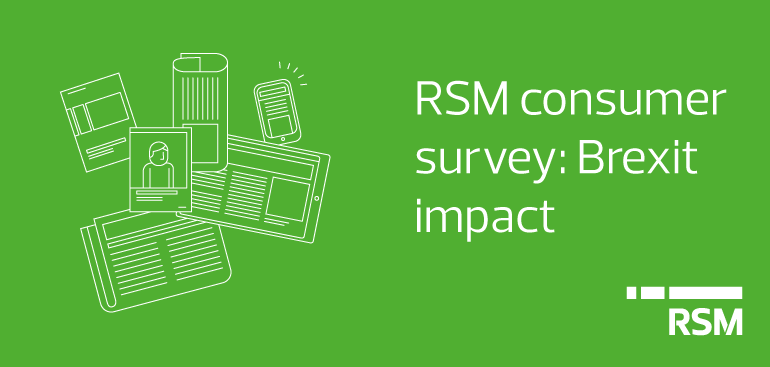
As heard on RTÉ Radio 1 News
People in Northern Ireland and the Republic of Ireland are equally pessimistic about the potential impacts on the wider economy while those in Northern Ireland are more likely to be worried about the impact of Brexit on their personal income.
Brexit has led to a downturn in consumer confidence across the island of Ireland, according to results from a new survey conducted by 3GEM on behalf of RSM, seeking the views of 1,000 people in Northern Ireland and the Republic of Ireland*.
Findings show that over 60% of people in Northern Ireland and the Republic of Ireland anticipate that Brexit will have a negative impact on the economy, however levels of consumer confidence and views on how it will impact on personal incomes vary greatly between the two jurisdictions and among age groups.
Economic Confidence
People in the Republic of Ireland and Northern Ireland are equally pessimistic about the impact of Brexit on the economy, with 65% of those surveyed in the Republic of Ireland and 63% of those in Northern Ireland agreeing. The level of concern was largely equal amongst the different age groups, with the exception of older people (73+) with only 30% of older people in Northern Ireland being worried, in comparison with 63% in the Republic of Ireland.
In Northern Ireland, it is Millennials (aged 24 -37) and Generation Z (38 – 53) that are the most concerned about the effect of Brexit.
Disposable Income
The report also demonstrates different attitudes towards the effects of Brexit on disposable income across the two jurisdictions. In Northern Ireland, 43% of consumers in Northern Ireland expect Brexit to have a strong impact on their disposable spending, compared with just 26% of consumers in the Republic of Ireland.
In Northern Ireland, younger generations are more concerned about Brexit than older generations, but the opposite occurs in the Republic. In Northern Ireland, only 10% of those surveyed aged 73+ anticipate that Brexit will have a strong impact on their disposable income compared with 38% in the Republic. In contrast, 42% of Millennials in the North strongly believe that Brexit will impact their disposable income compared with 22% of Millennials in the Republic of Ireland.
Overall, in Northern Ireland it is people in Belfast that say Brexit will have the biggest impact on their disposable spending. In the Republic of Ireland, concerns are felt more strongly in non-urban areas, and strongest in Connacht followed by Ulster.
Cross-Border Shopping
Approximately a quarter of people from both the Republic of Ireland and Northern Ireland currently travel across the border at least a couple of times a year. People in the Republic cross the border more frequently than those in the North for groceries and clothes, and home and electric goods, while people in Northern Ireland cross the border more often than those in the Republic of Ireland for petrol.
While the strength of the Euro against the Sterling over the past two years has made cross-border shopping more appealing, there is evidence that a hard border could impact on this. 59% of respondents from the Republic of Ireland say they are less likely to engage in cross-border shopping if there’s a hard border while 47% of respondents from Northern Ireland say they are less likely to shop over the border in the Republic of Ireland.
Tourism
In addition to cross-border shopping, the survey results indicate that cross-border tourism will also be affected by Brexit. 46% of people in the Republic of Ireland agree that they are less likely to visit Northern Ireland after Brexit. By contrast, only 27% of consumers in Northern Ireland agree with the statement that they are less likely to visit the Republic after Brexit, and 43% disagreeing – which indicates that the Republic of Ireland looks set to remain an attractive holiday option for those in Northern Ireland irrespective of Brexit 72% of those surveyed form Tyrone said they are likely to plan a cross border holiday, while Millennials and those in Dublin were most likely to agree that they are less likely to visit Northern Ireland post-Brexit.
Commentary
“This report indicates that consumers in Northern Ireland are feeling the strain of Brexit more than their counterparts in the Republic, especially younger people. Consumers in Northern Ireland believe that Brexit could have a major impact on income, and this is being felt more by younger generations than older people. Over the next 12 months, retailers will need to work harder to encourage consumers to part with their money. In our experience this uncertainty is somewhat mirrored amongst businesses. In RSM Ireland, we’ve witnessed a significant increase in contact and referrals from UK-based firms looking for advice and support on how to set up in Ireland. Many are holding off on making a final decision until the outcome of the UK vote in December, but in the meantime plans and investment – in either jurisdiction – run the risk of being paralysed,” said Áine Farrelly, Management Consulting Partner and Chief Operating Officer, RSM Ireland.
Richard Gardiner, RSM’s Managing Partner in Belfast commented: “Given both the economic uncertainty of Brexit and the political uncertainty with the suspension of the Northern Ireland Assembly, it is no surprise that there is anxiety amongst consumers. Interestingly, it is Millennials in Northern Ireland that are expressing the greatest concern when it comes to their disposable income, and younger consumers in the Republic that are less likely to visit Northern Ireland which could apply greater pressure on the retail, leisure and tourism sectors locally. As consumers increasingly seek out social media worthy experiences, investing in novel in-store experiences and excellent customer service could be key to driving future footfall.”
*The survey was conducted by 3GEM for RSM in the Republic of Ireland and Northern Ireland between October 15th – 22nd 2018.
